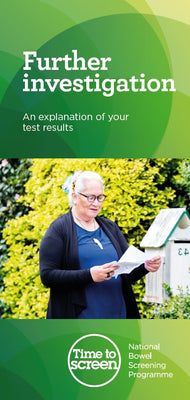Further investigation: An explanation of your test results - HP6819

Gives brief information in English for people who have received a positive bowel screening test result. The most common further investigation is a test called colonoscopy, that checks the bowel.
The full resource:
National Bowel Screening Programme
Your bowel screening test result is positive.
This does NOT necessarily mean that you have bowel cancer.
Small amounts of blood in your bowel motion are most commonly caused by polyps, or other minor conditions such as haemorrhoids (piles), which can easily be treated.
What happens next?
You will need a further investigation. The most common test to check your bowel is a colonoscopy.
What does a colonoscopy involve?
A colonoscopy involves a specially trained doctor or health professional putting a thin tube into your anus (bottom). There is a very small camera on the end of the tube which is used to examine the lining of your bowel, to see if there are any problems.
A colonoscopy can identify whether polyps or cancers are present.
If polyps are found they will usually be removed and sent to a laboratory to check for any cancer cells.
Polyps are not cancers, but may develop into a cancer over a number of years. Removing polyps is usually painless.
About seven in 10 people who have a colonoscopy as part of the National Bowel Screening Programme will have polyps, which if removed may prevent cancer developing
About seven in 100 people who have a colonoscopy as part of the National Bowel Screening Programme will be found to have cancer and most will require treatment.
Will it hurt?
You will be given medication that makes you sleepy and helps to minimise any discomfort. There will be a doctor and nurses in the room to care for you.
How do I prepare for my colonoscopy?
It is very important that your bowel is thoroughly emptied so that the lining can be clearly seen. You may be asked to stop eating some foods in the days before your colonoscopy. You will need to drink a special bowel cleansing preparation which will make you go to the toilet. Instructions come with your appointment letter.
How long will I need to stay in hospital?
The colonoscopy usually takes about 30 minutes, but you will need to be at the hospital for a few hours.
A nurse or doctor will talk with you before your colonoscopy and answer any questions you may have. You will be asked to sign a consent form.
Family members and support people are welcome to be with you while you wait to go into the room to have your colonoscopy.
Are there any risks from a colonoscopy?
Colonoscopy is generally considered a safe procedure. However, as with most medical procedures, problems can sometimes happen.
There is a small risk the colonoscopy procedure itself, or removal of polyps, will cause bleeding or damage to your bowel and you may need further treatment.
Do I need to pay for the colonoscopy, other tests or treatment?
The colonoscopy and any follow-up tests or treatments organised within the public health system are free.
What if I cannot keep my appointment?
It is very important you let us know as soon as possible if you are unable to come for your colonoscopy on the day and time arranged so we can organise another appointment for you.
If you cannot keep your appointment, or need to make another time, please call us on the phone number on your appointment letter as soon as possible.
What if I have bowel cancer?
If you are found to have bowel cancer you will be referred to a specialist. The main treatment for bowel cancer is surgery. In some cases chemotherapy or radiotherapy may be recommended.
How successfully can bowel cancer be treated?
People who are diagnosed with bowel cancer at an early stage have a much greater chance of being successfully treated. If the cancer is detected at a later, more advanced stage, it is harder to treat.
Do I have all the information I need?
It’s important that you are fully informed about all aspects of the National Bowel Screening Programme. You can find more information on the National Bowel Screening Programme at: www.timetoscreen.nz or freephone: 0800 924 432
Who can access my information?
Information about any further assessment or treatment you may need will be collected from both public and private health services and used to monitor and evaluate the National Bowel Screening Programme.
Personal information and data are collected, stored, accessed and destroyed to a standard that complies with the Health Privacy Code 1994.
If I am not satisfied with the service I received, how do I make a complaint?
The Code of Health and Disability Services Consumers’ Rights allows you to make a complaint in a way that is appropriate for you.
If you want to make a complaint about this programme or the service you have received, you can phone the National Bowel Screening Programme on 0800 924 432 for more information about the best options for you.
You can also get information from the Office of the Health and Disability Commissioner.
Call 0800 112 233 or visit www.hdc.org.nz
More information
For more information about the National Bowel Screening programme:
- please visit www.timetoscreen.nz
- free phone 0800 924 432
- email info@bowelscreening.health.nz
- or talk to your doctor.
Code: HP6819.